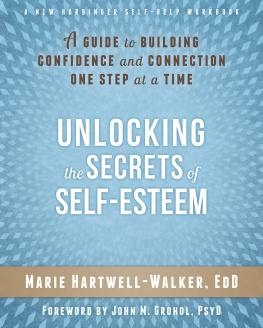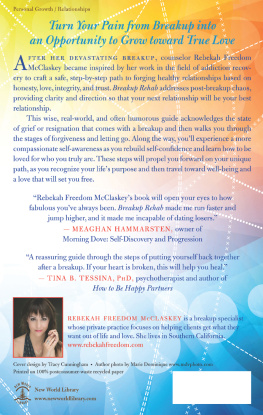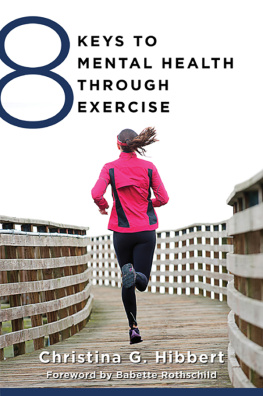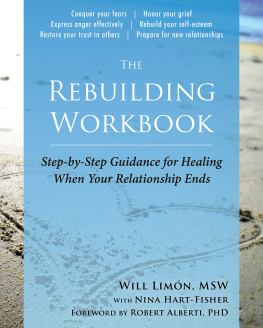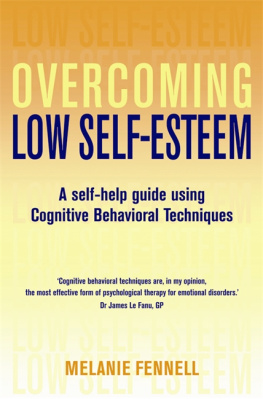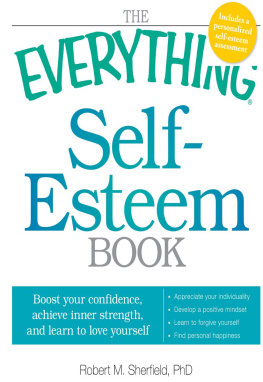
Christina G. Hibbert, PsyD, is a clinical psychologist and expert on womens mental health, grief, motherhood, postpartum health, parenting, self-esteem, and personal growth. She is author of the IPPY Award-winning memoir This is How We Grow, and co-producer of the internationally-sold DVD Postpartum Couples. Hibbert is founder of the Arizona Postpartum Wellness Coalition, a non-profit organization, and is a popular and dynamic speaker. She lives in the mountains of Flagstaff, AZ with her husband and six children. Learn more about Hibbert, her blog, speaking, and books at www.drchristinahibbert.com.
Foreword writer Sue Patton Thoele is a psychotherapist, former hospice chaplain, and bereavement group leader. She is author of several books, including The Courage to Be Yourself.
As much as we might wish for an easier path to personal growth, the most effective ones often seem to be paved with heartache, despair, and fears that throw us unceremoniously to our knees. Each section of Hibberts excellent book Who Am I Without You? is filled with valuable information, unfailing compassion, and practical healing techniques that can help you move and grow through the brokenness of grief, disillusionment, and fear.
Sue Patton Thoele, author of The Courage to Be Yourself and The Mindful Woman
Who Am I Without You? is the light at the end of the tunnel! Christina Hibbert has written a compassionate guide for surviving a breakup with a sensitivity and exquisite insight that even in the heartbreak of relationship loss, there is an opportunity for psychological change and personal growth.
Diana Lynn Barnes, PsyD, psychotherapist specializing in womens mental health, coauthor of The Journey to Parenthood, and editor and contributing author of Womens Reproductive Mental Health Across the Lifespan
With just the right blend of empathy for the readers pain and encouragement to move forward, Christina Hibbert has written an accessible, practical, and compassionate guidebook for reclaiming self-worth after a breakup. Ive seen hundreds of women in my psychotherapy practice who feel unworthy of love, and whose self-esteem has taken a blow after a failed relationshipand I wish Id had this book to recommend to them! Who Am I Without You? is a much-needed companion on the road to resolving emotional barriers, reclaiming your worth, and re-envisioning a life of love after loss.
Julie de Azevedo Hanks, LCSW, psychotherapist, author of The Burnout Cure, and owner and executive director of Wasatch Family Therapy

Publishers Note
This publication is designed to provide accurate and authoritative information in regard to the subject matter covered. It is sold with the understanding that the publisher is not engaged in rendering psychological, financial, legal, or other professional services. If expert assistance or counseling is needed, the services of a competent professional should be sought.
Distributed in Canada by Raincoast Books
Copyright 2015 by Christina G. Hibbert
New Harbinger Publications, Inc.
5674 Shattuck Avenue
Oakland, CA 94609
www.newharbinger.com
Cover design by Amy Shoup
Interior design by Michele Waters-Kermes
Acquired by Wendy Millstine
Edited by Marisa Sols
All Rights Reserved
Library of Congress Cataloging-in-Publication Data on file
Contents
1 Youre not alone.
2 Set up your support system.
3 Help others help you.
4 Set healthy boundaries.
5 Put yourself on your list.
6 Accept what is.
7 Now let it outFEEL.
8 Worry: Its good for nothing.
9 Dont let anger get the best of you.
10 Identify your losses.
11 Grieve.
12 But how do I grieve? You just do.
13 Tackle your broken thoughts.
14 What are you thinking?
15 Stop the broken record.
16 Change your mind.
17 Get a new view and a new you.
18 Face your fears.
19 You are more than your relationships.
20 Get your self-esteem back.
21 Lay a mindful foundation.
22 Ask yourself, Who am I?
23 Shift from self-esteem to self-worth.
24 Learn about the Pyramid of Self-Worth.
25 Rebuilding, step 1: Practice self-awareness.
26 Ask yourself, How am I?
27 See the not-so-good.
28 See the good.
29 Rebuilding, step 2: Practice self-acceptance.
30 Learn how to accept yourself.
31 Stop the blame game and own your stuff.
32 Rebuilding, step 3: Practice self-love.
33 Love your physical, emotional, mental, social, and spiritual sides.
34 Rebuilding, step 4: Build on self-worth to reach your fullest potential.
35 Believe in you.
36 Forgive.
37 Commit to being better than just better.
38 Flourish! Yes, I said, Flourish!
39 Live in the now.
40 Practice gratitude.
41 Discover meaning and purpose.
42 Live with vision.
43 Set a daily focus.
44 Choose to create the life you desire.
45 The good life isnt necessarily the best life.
46 Develop your mission statement.
47 Learn to be an optimist!
48 Let yourself shine!
49 Live the Golden Rule.
50 Engage in healthy, loving relationships.
51 Let the light and love in.
52 It only gets better from here.
Foreword
When I was thirty years old, my first husband became obsessed with a woman in our social circle whom I thought of as a good friend. For months, I used denial to protect myself from facing the reality of their relationship. Eventually, of course, I had to face my fear and acknowledge the truth. The double betrayal of husband and friend was devastating. The thought of my two little boys being the children of divorce, and the idea of being a single parent, was guilt-inducing, terrifying, and incredibly saddening. I did everything I could to save the marriageeach attempt unsuccessful and many at the expense of my own well-being, including reconciling three times. Some, rightly, called those my peace-at-any-price groveling times. However, as the adage goes, It takes two to make a marriage work; and a couple of years after learning the truth, I found myself staggering through the wreckage of a failed marriage and the disintegration of life as I knew, and wanted, it.
Yes, the marriage was beyond repair. Worse yet, for a long time, I felt I was too.
If you are in a similar position right nowor have troubling residual feelings from a past breakupplease do yourself a huge favor and allow Who Am I Without You? to become your friend and guide. I truly believe the healing and growth that took me years and years to achieve would have taken much less time if Id had access to the invaluable insights and tools offered in Who Am I Without You? Author and psychologist Christina Hibbert divides her book into three main sections: Overcoming, Becoming, and Flourishing. Each is filled with valuable information, unfailing compassion, and practical healing techniques to help you move through the brokenness of grief, disillusionment, and fear. The reader can feel Dr. Hibberts understanding radiating from the pages and, in the light of that perception and encouragement, is given the opportunity to make steady progress toward healing and wholeness.
As much as we might wish for an easier path to personal growth, the most effective ones often seem to be paved with heartache, despair, and fears that throw us unceremoniously to our knees. While some breakthroughs and enlightenments may come softly, quietly, and in bite-size pieces, mine are more often gleaned from the impetus of pain and loss. Such was the case with my divorce. Even though it took a long time, my story has a happy outcome. My career as a psychotherapist evolved from the pain and insights of that journey, and my first book,


